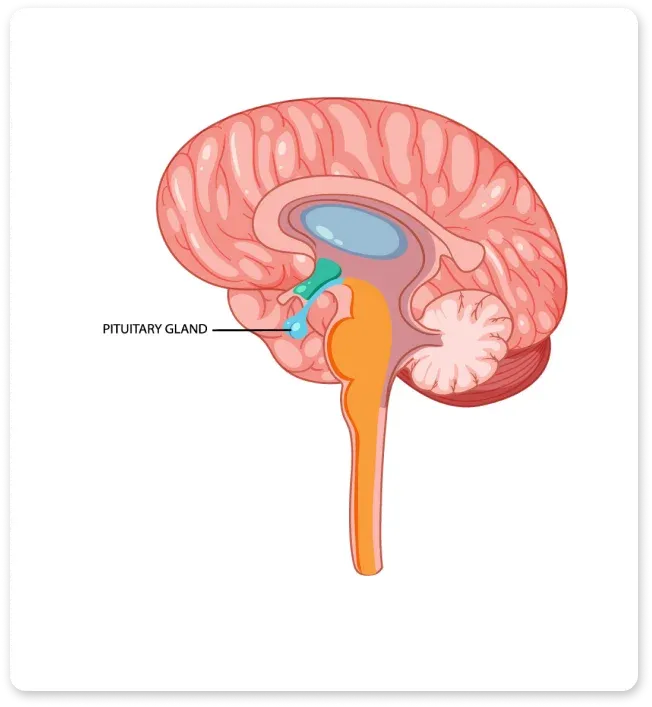When we talk about women's health, it's easy to focus on well-known issues like reproductive health and breast cancer. Still, other issues like endocrine health and adrenal and pituitary disorders often don't receive the same spotlight. Yet, these disorders can profoundly impact a person's life, affecting everything from energy levels and stress responses to reproductive health and bone density. As an expert endocrinologist, Dr. RIZVI aims to shed light on these conditions, thoroughly understanding adrenal and pituitary disorders and how we manage them to enhance your quality of life.
The Endocrine System Disorders
The adrenal gland is a sophisticated system of glands that produces and regulates hormones into the bloodstream, regulating various body functions, including metabolism, growth, mood, and reproductive processes. Two critical components of this system are the adrenal and pituitary glands.
Adrenal glands are located above both kidneys. These powerful glands produce essential hormones like cortisol, adrenaline, and aldosterone, which help regulate stress responses, metabolism, and blood pressure.
Adrenal Disorders
Addison's Disease
Addison's disease is an uncommon disorder in which the adrenal glands do not produce enough of certain hormones like cortisol and sometimes aldosterone, leading to various symptoms and complications. The most common symptoms include chronic fatigue, weight loss, weak muscles, low blood pressure, and darkening of the skin. Some individuals also experience salt cravings due to aldosterone deficiency. R-endocrinology typically diagnoses it through blood tests that measure cortisol levels and ACTH stimulation tests. An adrenal scan or CT scan may also be used to assess gland structure. Treatment involves hormone replacement therapy to compensate for the deficient hormones. Regular monitoring is essential to adjust medication dosages and manage symptoms effectively.
Cushing's Syndrome
Cushing's syndrome arises from prolonged exposure to high levels of cortisol. This condition may be caused by a pituitary tumor, known as Cushing's disease, adrenal tumors, or the use of corticosteroid medications. The common symptoms are weight gain (especially around the abdomen and face), high blood pressure, diabetes, and mood swings. Individuals may also experience thinning skin and easy bruising. R-endocrinology recommends that patients take blood, urine, or saliva tests to measure cortisol levels. MRI or CT scans are used to find tumors. Its treatment depends on the cause. Surgical removal of tumors, radiation therapy, or medication inhibiting cortisol production are common approaches. Corticosteroid replacement therapy may be necessary if adrenal function is compromised after treatment.
Adrenal Insufficiency
Adrenal insufficiency, also known as Addison's disease, is a severe medical condition characterized by the insufficient production of hormones by the adrenal glands. This can be primary (Addison's disease) or secondary, often due to pituitary problems affecting ACTH production. The patient feels persistent fatigue, muscle weakness, and unintentional weight loss. Individuals might also experience low blood sugar levels and dizziness. R-endocrinology recommends blood tests to measure cortisol and ACTH levels and an ACTH stimulation test to help diagnose adrenal insufficiency. Imaging may be used to investigate underlying causes. Treatment typically involves lifelong hormone replacement therapy. Regular follow-ups ensure that hormone levels remain balanced and that symptoms are managed.
Pituitary Disorders
Hypopituitarism
Hypopituitarism is a severe condition characterized by an inadequate production of one or more hormones due to pituitary gland failure. This can lead to deficiencies in thyroid, adrenal, and reproductive hormones. Symptoms vary depending on which hormones are deficient. Common issues include fatigue, weight loss, decreased libido, and menstrual irregularities in women. Diagnosis involves conducting blood tests to measure levels of pituitary hormones and their target hormones. Imaging studies like MRI are used to identify structural abnormalities in the pituitary. Treatment involves hormone replacement therapy tailored to the specific deficiencies. Managing hypopituitarism requires regular monitoring to adjust hormone levels and ensure overall health.
Pituitary Tumors
Pituitary tumors, or adenomas, are abnormal growths in the pituitary gland that can impact hormone production and cause various symptoms, depending on the tumor type and size. Doctors have found that as many as 1 in 4 people may have a pituitary adenoma without knowing it.
</div>
https://www.cancer.org/cancer/types/pituitary-tumors/about/key-statistics.html
They may include headaches, vision problems, and symptoms related to excess hormone production, such as irregular menstrual cycles or milk production. R-Endocrinology refers to tests, such as MRI or CT scans, to visualize the tumor. Blood tests measure hormone levels to determine the tumor's impact on endocrine function. Radiation therapy and medications are used to manage hormone levels and reduce tumor size; surgery is needed to remove it. Lifelong monitoring is often necessary to detect any recurrence.
Acromegaly
Acromegaly is a hormonal disorder caused by excessive growth hormone production, often due to a pituitary tumor. Different symptoms include enlarged hands and feet, facial changes (such as protruding jaw and enlarged nose), and joint pain. Individuals may also experience cardiovascular issues and diabetes. Diagnosing acromegaly at R-endocrinology involves measuring growth hormone levels and assessing insulin-like growth factors. MRI scans help identify pituitary tumors. Treatment options include medication to reduce growth hormone production, and sometimes radiation therapy. Managing symptoms and monitoring hormone levels are crucial for long-term health.
The Path to Diagnosis and Treatment
Diagnosing adrenal and pituitary disorders involves a combination of clinical evaluation and laboratory tests. Blood tests measure hormone levels and identify imbalances, while MRI and CT scans provide insights into gland structure and potential tumors. An endocrinologist at R-endocrinology will perform a thorough evaluation, considering your medical history, symptoms, and test results. This comprehensive approach ensures accurate diagnosis and effective treatment planning.
Personalized Treatment Plans: R-endocrinology treatment plans are highly individualized. They may involve medication to replace or suppress hormone levels, surgical interventions to remove tumors, or lifestyle adjustments to support overall health. Regular follow-ups are essential to monitor progress and make necessary adjustments.
Living with Endocrine Disorders
Managing adrenal and pituitary disorders requires a proactive approach. Regular medical appointments, medication adherence, and lifestyle changes are essential to effective management.
- Medication Management: Adhering to prescribed medication regimens is crucial for controlling hormone levels and managing symptoms. Based on regular follow-up assessments, adjustments may be needed.
- Lifestyle Adjustments: By integrating a nutritious, well-rounded diet, regular physical activity, and effective stress management techniques into your lifestyle, you can actively promote and maintain optimal endocrine health, leading to an enhanced quality of life.
- Support and Education: Joining support groups and staying informed about your condition can provide emotional support and practical advice. Educating yourself about your disorder helps you manage symptoms and make better health decisions.
Conclusion
Understanding adrenal and pituitary disorders is vital because these conditions can have far-reaching effects on a woman's health. They can influence everything from mood and energy levels to reproductive health and metabolic function. Awareness and early diagnosis are crucial for effectively managing these disorders and maintaining a high quality of life.
If you suspect you might have an adrenal or pituitary disorder, or if you experience symptoms like unusual fatigue, unexplained weight changes, or irregular menstrual cycles, virtual consultation at R-endocrinology will help you as a healthcare professional. Most women with these conditions can lead healthy, fulfilling lives with appropriate care and management.







